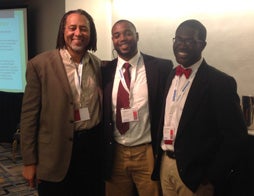They’re a self-proclaimed motley crew implementing an unconventional program. But, it works.
College of Charleston teacher education professor Renard Harris received a Center for Partnerships to Improve Education Faculty Fellowship to assemble a team and teach required curriculum standards to elementary students using storytelling. The Teaching and Learning with Engaging Stories (TALES) program has been so successful, the team was invited to present at a national afterschool conference in New York.
Harris says it is the best thing he’s been involved with at the College.
ASSEMBLING THE TEAM
Harris fondly calls the group a motley crew. They are different ages, races, and genders. They each have different strengths, are pursuing different degrees, and were drawn to the program for a different reason.
Cyndi Hall needed one more credit to earn her Master’s in Education in Science and Math for Teachers and she brought a strong education background. Tristan Hawkins, a senior middle grades education major, wanted to work with kids. He is the team’s quiet observer. Hammed Sirleaf just needed a job. But, the junior is amazing with kids and from this experience learned he wants to pursue a career encouraging minority students to go to college.
[Related: Tristan Hawkins is part of the Call Me Mister program.]
“The more we hung out, the more we started to understand each other and play off each others strengths,” Hall explains. “Our weekly meetings were some of my favorite times because we really talked about education and teaching philosophy like I don’t always get to.”
MAKING IT WORK
In summer 2013, Harris assembled a group of students – both undergraduate and graduate – to identify the standard indicators around the curriculum and then develop engaging stories that teach the indicators.
The TALES team refined the stories, then went once a week for 50 minutes to two Charleston County schools – Sanders-Clyde Elementary and North Charleston Elementary. Each week, they met with eight to 10 fourth graders and did a pre-test, told the story, did a related hands-on activity, then conducted a post-assessment. All sessions were video taped so the team could see the student’s reactions and refine the stories.
“It was a rough start,” Harris admits. “We were new faces trying to instruct them. A few students loved us immediately, but others were not feeling us at all. The rapport grew each week to where you could tell they really valued the time with us.”
Hawkins adds, “That one day a week, you can just tell it means something. It’s pretty powerful.”
SEEING SUCCESS
They never would have guessed that six months after starting TALES, they would be in New York presenting their project at the National Afterschool Association Annual Convention. It was the first time Hawkins and Sirleaf had ever been on a plane. Their trip was made possible by donations from CPIE, the School of Education, Health, and Human Performance, the Office of Institutional Diversity, R.O.A.R., and Multicultural Student Programs and Services.
“I met so many people that I can network with now, so many people that have been in my shoes – a young kid from a small city, not having everything growing up, but now they have their Ph.D. and are doing what they love. I didn’t realize how many opportunities were out there – New York City opened me up so much,” Hawkins says.
“I just needed a job when I started, but this became so much deeper,” Sirleaf says.
Harris is hoping to draft a case study for publication and develop further research opportunities. The original grant, from the College’s Center for Partnerships to Improve Education, has expired and he and Hall are looking for more grants that can keep the project going.
[Related: Learn more about the Center for Partnerships to Improve Education.]
“I’ve graduated, but I just can’t walk away from this project. I love seeing the alternative strategies,” Hall says.
For more information, contact Renard Harris at harrisr@cofc.edu.





